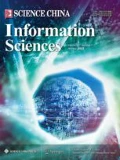Abstract
Group key agreement protocols are crucial for achieving secure group communications. They are designed to provide a set of users with a shared secret key to achieve cryptographic goal over a public network. When group membership changes, the session key should be refreshed efficiently and securely. Most previous group key agreement protocols need at least two rounds to establish or refresh session keys. In this paper, a dynamic authenticated group key agreement (DAGKA) protocol based on identity-based cryptography is presented. By making use of the members’ values stored in previous sessions, our Join and Leave algorithms reduce the computation and communication costs of members. In the proposed protocol, Setup and Join algorithms need one round. The session key can be refreshed without message exchange among remaining users in Leave algorithm, which makes the protocol more practical. Its security is proved under decisional bilinear Diffie-Hellman (DBDH) assumption in random oracle model.
Similar content being viewed by others
References
Diffie W, Hellman M. New directions in cryptography. IEEE Trans Inf Theory, 1976, 22: 644–654
Joux A. A one round protocol for tripartite Diffie-Hellman. In: Bosma W, ed. Proc of ANTS IV, LNCS 1838. Berlin: Springer, 2000. 385–394
Ingemarsson I, Tang D T, Wong C K. A conference key distribution system. IEEE Trans Inf Theory, 1982, 28: 714–720
Barua R, Dutta R, Sarker P. Extending Joux’s protocol to multi party key agreement. In: Johansson T, Maitra S, eds. Proc of Indocrypt’ 03, LNCS 2904. Berlin: Springer, 2003. 205–217
Reddy K C, Nalla D. Identity-based authenticated group key agreement protocol. In: Menezes A, Sarkar P, eds. Proc of Indocrypt’ 02, LNCS 2551. Berlin: Springer, 2002. 215–233
Bresson E, Chevassut O, Pointcheval D. Provably authenticated group Diffie-Hellman key exchange. In: Samarati P, ed. Proc of CCS’01. New York: ACM, 2001. 255–264
Katz J, Yung M. Scalable protocols for authenticated group key exchange. In: Boneh D, ed. Proc of Crypto’03, LNCS 2729. Berlin: Springer, 2003. 110–125
Burmester M, Desmedt Y. A secure and efficient conference key distribution system. In: Santis A D, ed. Proc of Eurocrypt’94, LNCS 950. Berlin: Springer, 1995. 275–286
Choi K Y, Hwang J Y, Lee D H. Efficient ID-based group key agreement with bilinear maps. In: Bao F, Robert H D, Zhou J Y, eds. Proc of PKC 2004, LNCS 2947. Berlin: Springer, 2004. 130–144
Choi K Y, Hwang J Y, Lee D H. ID-based authenticated group key agreement secure against insider attacks. IEICE Trans Fundament, 2008, E91-A: 1828–1830
Bresson E, Manulis M. Securing group key exchange against strong corruptions. In: Abe M, Gligor V D, eds. Proc of ASIACCS 2008. New York: ACM, 2008. 249–260
Gorantla M C, Boyd C, Nieto J M G. Modeling key compromise impersonation attacks on group key exchange protocols. In: Stanislaw J, Gene T, eds. Proc of PKC 2009, LNCS 5443. Berlin: Springer, 2009. 105–123
Bohli J M, Vasco M I G, Steinwandt R. Secure group key establishment revisited. Int J Inf Secur, 2007, 6: 243–254
Boyd C, Nieto J M G. Round-optimal contributory conference key agreement. In: Desmedt Y, ed. Proc of PKC’03, LNCS 2567. Berlin: Springer, 2003. 161–174
Shi Y, Chen G, Li J. ID-based one round authenticated group key agreement protocol with bilinear pairings. In: Selvaraj H, Srimani P K, eds. Proc of ITCC 2005. Los Alamitos: IEEE Computer Society, 2005. 757–761
Gorantla M C, Boyd C, Nieto J M G, et al. Generic one round group key exchange in the standard model. In: Lee D, Hong S, eds. Proc of ICISC 2009, LNCS 5984. Berlin: Springer, 2010. 1–15
Wu Q H, Mu Y, Susilo W, et al. Asymmetric group key agreement. In: Joux A, ed. Proc of Eurocrypt 2009, LNCS 5479. Berlin: Springer, 2009. 153–170
Zhang L, Wu Q H, Qin B, et al. Identity-based authenticated asymmetric group key agreement. In: Thai M T, Sahni S, ed. Proc of COCOON 2010, LNCS 6196. Berlin: Springer, 2010. 510–519
Bresson E, Chevassut O, Pointcheval D. Provably authenticated group Diffie-Hellman key exchange-the dynamic case. In: Boyd C, ed. Proc of Asiacrypt 2001, LNCS 2248. Berlin: Springer, 2001. 290–309
Bresson E, Chevassut O, Pointcheval D. Dynamic group Diffie-Hellman key exchange under standard assumptions. In: Lee P J, ed. Proc of Eurocrpt’02, LNCS 2332. Berlin: Springer, 2002. 321–336
Kim Y, Perrig A, Tsudik G. Simple and fault-tolerant key agreement for dynamic collaborative groups. In: Samarati P, ed. Proc of CCS 2000. New York: ACM, 2000. 235–244
Dutta R, Barua R. Dynamic group key agreement in tree-based setting. In: Boyd C, Manuel J, Nieto G, eds. Proc of ACISP 2005, LNCS 3574. Belin: Springer, 2005. 101–112
Dutta R, Barua R. Provably secure constant round contributory group key agreement in dynamic setting. IEEE Trans Inf Theory, 2008, 54: 2007–2025.
Kim H J, Lee S M, Lee D H. Constant-round authenticated group key exchange for dynamic groups. In: Lee P J, ed. Proc of Asiacrypt 2004, LNCS 3329. Berlin: Springer, 2004. 245–259
Li H, Wu C K, Teng J K. Dynamic tree-based authenticated group key exchange protocol. Sci China Inf Sci, 2010, 53: 1591–1602
Shamir A. Identity-based cryptosystems and signature schemes. In: Blakley G R, Chaum D, eds. Proc of Crypto’84, LNCS 196. Berlin: Springer, 1984. 47–53
Boneh D, Franklin M. Identity-based encryption from the weil pairing. In: Kilian J, ed. Proc of Crypto’01, LNCS 2139. Berlin: Springer, 2001. 213–229
Barreto P S L M, Kim H Y, Scott M. Efficient algorithms for pairing based cryptosystems. In: Yung M, ed. Proc of Crypto’ 2002, LNCS 2442. Berlin: Springer, 2002. 354–368
Author information
Authors and Affiliations
Corresponding author
Rights and permissions
About this article
Cite this article
Teng, J., Wu, C. & Tang, C. An ID-based authenticated dynamic group key agreement with optimal round. Sci. China Inf. Sci. 55, 2542–2554 (2012). https://doi.org/10.1007/s11432-011-4381-x
Received:
Accepted:
Published:
Issue Date:
DOI: https://doi.org/10.1007/s11432-011-4381-x




